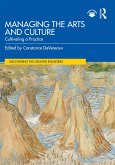This shortform book tells the research story of cultural management, helping scholars to analyse and combine theoretical models into an approach of their own.
Cultural management emerged and developed out of the field of arts management in the 1980s, which imported managerial techniques and assumptions from mainstream commercial business into the arts. In the late 1990s, the field integrated entrepreneurial approaches to management in the creative industries before adapting to a new model, based on user experiences and co-creation. These historical phases are theorised respectively as cultural management 1.0, cultural management 2.0 and cultural management 3.0. Yet they also overlap. Bringing together theories of management and creativity, this book enables scholars to get a grip on the underlying assumptions and conditions which lie behind an eclectic and evolving field.
The author, an established expert in this field, empowers scholars and reflective practitioners to develop their own approach to cultural management, drawing on the available approaches, and to recognise that successful cultural management is contingent on understanding the context (organisational and personal) within which these models will be applied.
Cultural management emerged and developed out of the field of arts management in the 1980s, which imported managerial techniques and assumptions from mainstream commercial business into the arts. In the late 1990s, the field integrated entrepreneurial approaches to management in the creative industries before adapting to a new model, based on user experiences and co-creation. These historical phases are theorised respectively as cultural management 1.0, cultural management 2.0 and cultural management 3.0. Yet they also overlap. Bringing together theories of management and creativity, this book enables scholars to get a grip on the underlying assumptions and conditions which lie behind an eclectic and evolving field.
The author, an established expert in this field, empowers scholars and reflective practitioners to develop their own approach to cultural management, drawing on the available approaches, and to recognise that successful cultural management is contingent on understanding the context (organisational and personal) within which these models will be applied.
"A skilful and highly readable analysis of how cultural management has emerged is an indispensable resource for anyone wanting to understand the distinctive assumptions, dilemmas and conceptual models that, at each key stage, have contributed to the development of this fascinating evolving field." Gillian Doyle, Professor of Media Economics, University of Glasgow, UK
"Chris Bilton has undertaken a forensic approach to understanding the complexity of cultural management in all its forms. It is a significant contribution to the theoretical framework and will be much appreciated by those in the field." Jo Caust, University of Melbourne, Australia
"This accessible and reflexive story of cultural management insightfully weaves the theories of creativity, management, innovation and leadership. It tells us that cultural management is an ever-evolving, paradoxical practice that is centred on constructively reconciliating tensions across cultural production, distribution and consumption. A great resource for cultural managers, scholars and students." Hye-Kyung Lee, Professor of Cultural Policy, King's College London, UK
"Chris Bilton has undertaken a forensic approach to understanding the complexity of cultural management in all its forms. It is a significant contribution to the theoretical framework and will be much appreciated by those in the field." Jo Caust, University of Melbourne, Australia
"This accessible and reflexive story of cultural management insightfully weaves the theories of creativity, management, innovation and leadership. It tells us that cultural management is an ever-evolving, paradoxical practice that is centred on constructively reconciliating tensions across cultural production, distribution and consumption. A great resource for cultural managers, scholars and students." Hye-Kyung Lee, Professor of Cultural Policy, King's College London, UK








